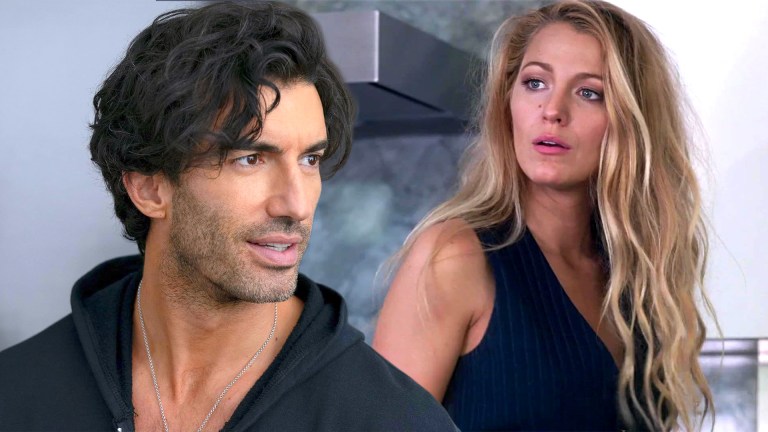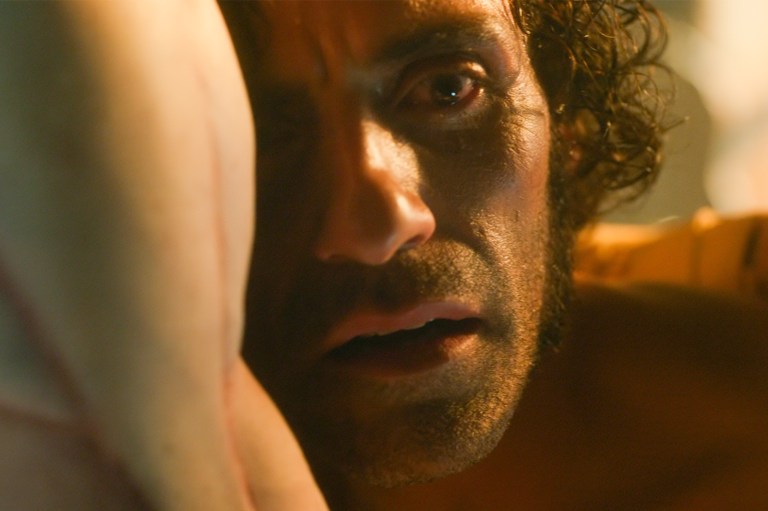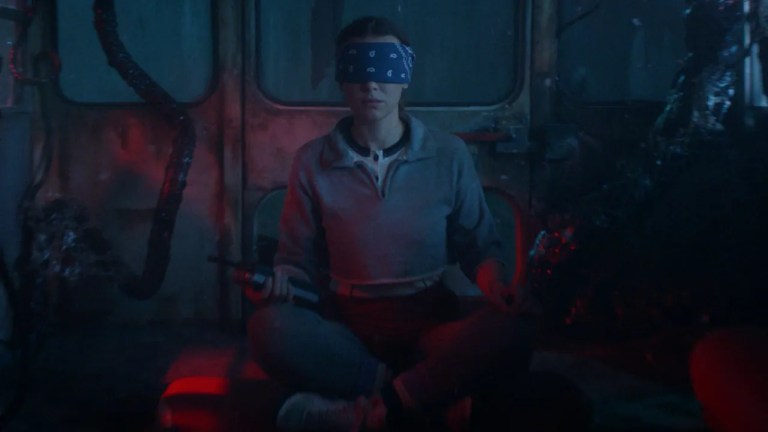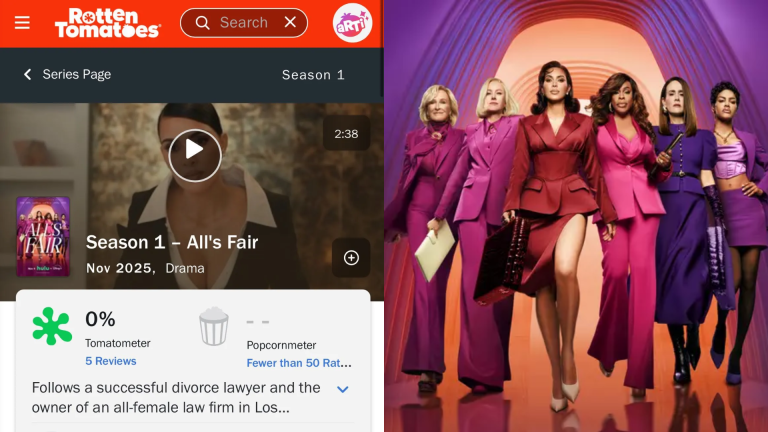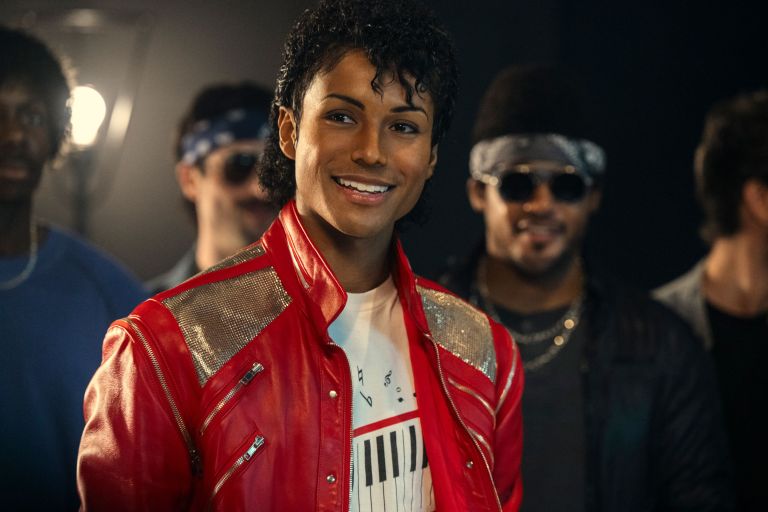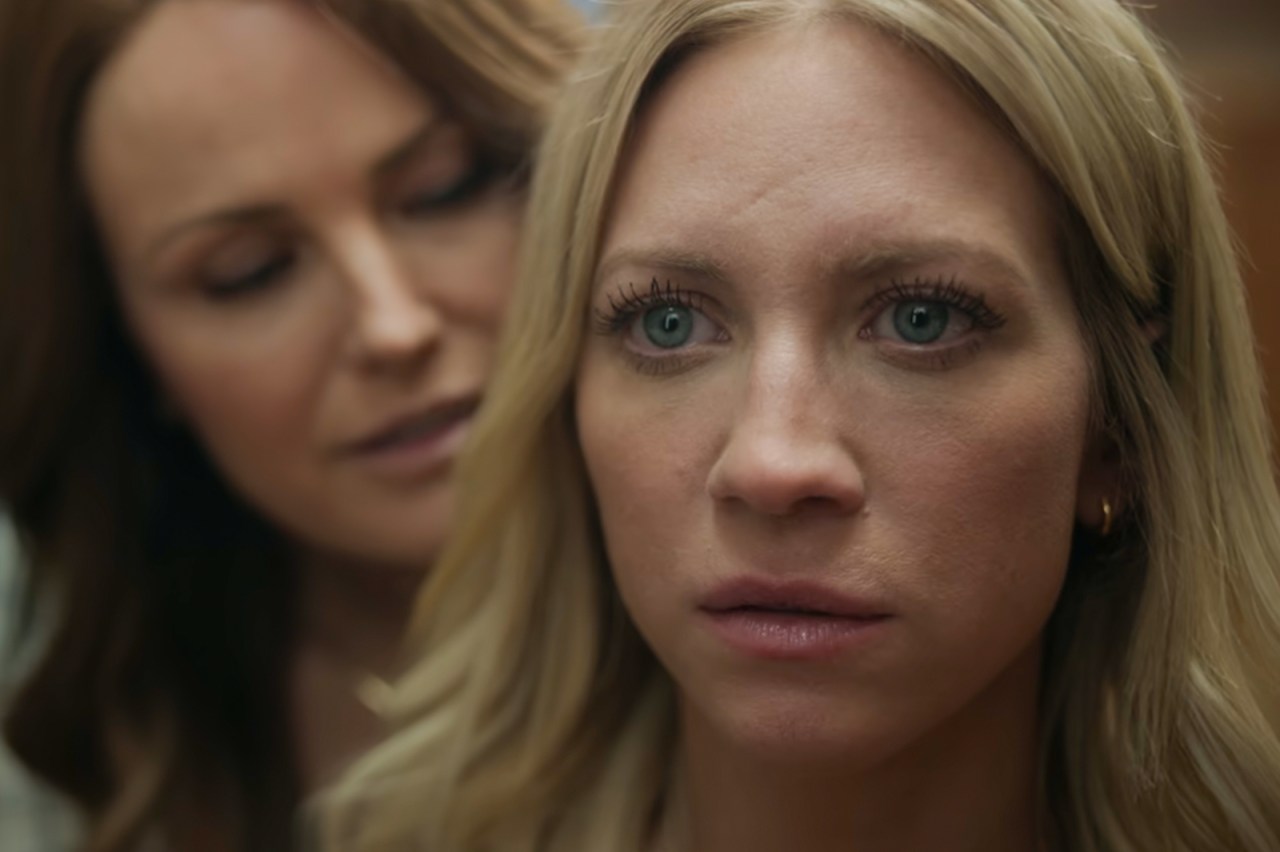
Behind Its Literal and Figurative Body Counts, ‘The Hunting Wives’ Is Really About Messy Love
The Hunting Wives is an enigma within an enigma.
Upon first glance, you think you’re walking into a super-shallow soapy glorification of conservative Texas female culture—a sorority recruitment TikTok made into a miniseries for 40-somethings. Then, word gets around, the series is teeming with lesbian power-play chemistry and satire, and even touts a pegging scene, and suddenly gays and gun-owners are glued to the same tube.
But the absolute genius in Rebecca Cutter’s writing (she took major liberties with May Cobb’s source material), is that the hypocrisy she exposes stretches far beyond party lines, gender, or sexual orientation. Human nature is, in itself, deeply, deeply flawed, but there is something beautiful to be found in those rare moments where we allow another person to see us, exactly as we are—warts, wrinkles, master manipulation, and all…
This is NOT a murder mystery
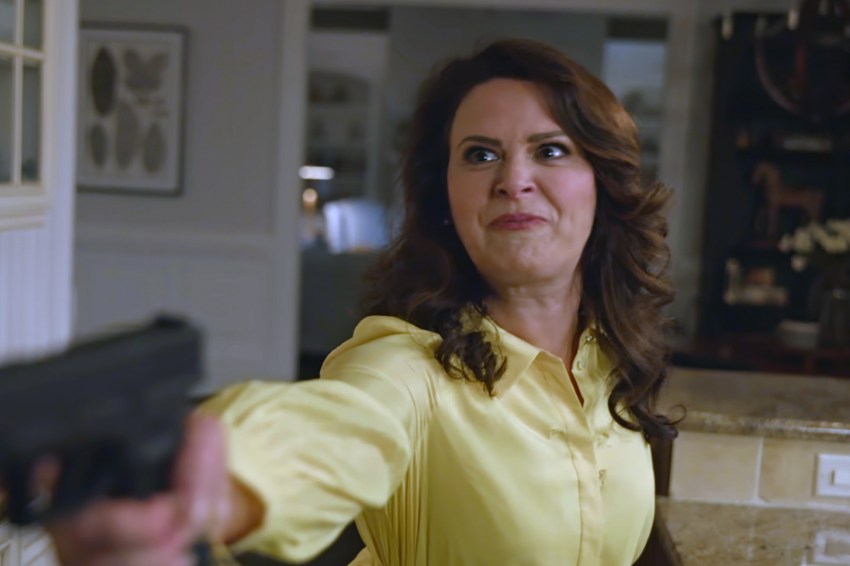
Cutter knows how to play with stereotypes (clearly), and sets up all of the typical tropes of a modern-day murder mystery included disjointed timelines, an unreliable protagonist, and plenty of psychological intrigue. But we quickly go from questioning whether Brittany Snow’s Sophie is the murder victim (the back of a blonde head in the dark leaves things open) or the murderer (Sophie’s blackout, her gun as the murder weapon, and trail camera footage showing her talking to the victim at the scene of the crime are all damning), to realizing those were never the questions we should have been trying to answer in the first place.
As Sophie turns sleuth to clear her name, the plot quickly spirals out of control and characters start dropping like flies. Starr, on her vigilante shit, breaks into Jill’s home, where Jill guns her down, supposedly in self-defense. Margo and Callie are the next to show up uninvited, and find Starr’s body splayed out on the kitchen floor. Callie ends up shooting Jill in a heated exchange, and is lauded for it on national television by Nancy Grace. And we can’t forget Pastor Pete’s roadside suicide where police discover not one, but two kidnapping victims in his cargo trailer.
All of this surrealism is building up to the supercharged reveal and cliff-hanger finale. Femme fatale with a trailer-park past, Margo, is finally revealed as Abby’s real killer, and pleads with Sophie not to turn her over to police in one breath, and in the other, declares her love for her.
Sophie is no angel herself
By the time we get to this point, a very important observation needs to be made—when she first arrived in Maple Brook, Sophie was the only person guilty of murder, having made a prior DUI manslaughter case seemingly “disappear” without facing major consequences beyond a temporary DCFS investigation.
Technically, she’s in no position to judge Margo, or any of the other women, in that regard, and Margo calls her out on it directly. She presents evidence of her loyalty (Kyle is to blame for Sophie’s framing, and Margo took steps to fix it), and then counters Sophie’s accusations by suggesting they’re both psychopaths (the ultimate “takes one to know one”) saying: “You knew what I was all along. You sensed it, and you still wanted to be with me”.

Margo equates the murder to a drunken mistake and pleads that she can’t go to jail, that this is her very life at stake, all of which Sophie should understand. Even though these two women are embodying sexual stereotypes (older, “more experienced” Margo corrupts “sweet, innocent” Sophie), they are extremely similar on paper, and Sophie’s protestations are merely hypocrisy disguised as play-acting.
Who is manipulating who?
As Margo delivers her speech, we can’t help but wonder if Sophie is on track to become the next Callie, another disposable pawn for Margo to gaslight, but we realize that Sophie is not only capable of, but has already perpetrated many of the same manipulative tactics against other people.
In a hilarious flashback that leans into 2010s tropes and fashion (holy side bangs), Sophie similarly discards an ex-lover in the form of a female roommate, the “once like a million years ago” she references when Margo asks about her sexual history after their first encounter. But this isn’t the meaningless drunken hook-up mistake Sophie claims it to be, as the roommate confronts her, revealing Sophie told her she loved her.
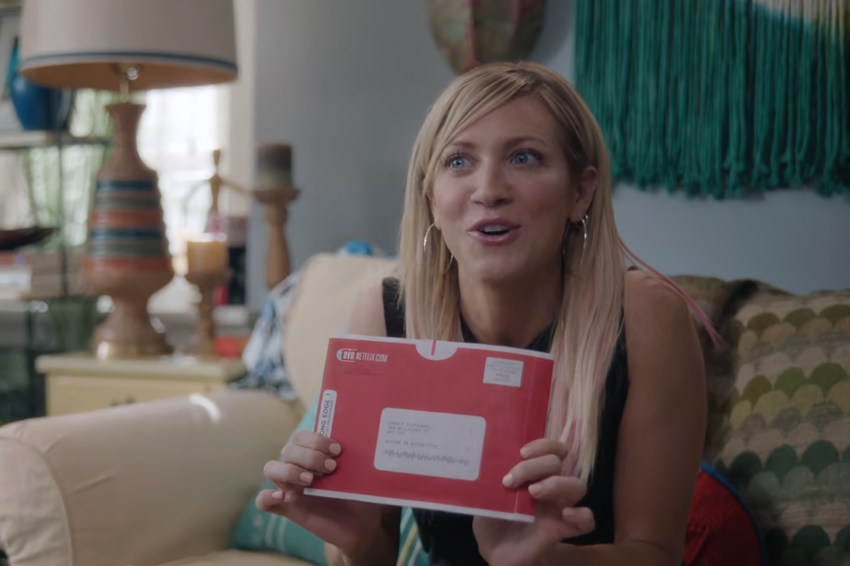
Sophie bails to go smoke on the front stoop, where she first meets future-husband, Graham, and now we have our perfectly reasonable explanation for how these two ever ended up together—he’s Sophie’s escape hatch to avoid dealing with her own sexuality.
Sophie will later claim that her reckless behavior and drug abuse stem from the inner turmoil she faced after her hysterectomy, but we can fill in the blanks ourselves. She didn’t “lose” a piece of herself after the surgery, she’s been hiding one for much longer than that.
And while Graham is far from the ideal partner, and definitely does not understand or support Sophie as she deals with the hysterectomy and the manslaughter chargers, he is ultimately not to blame for the fact that their entire relationship appears to be built upon Sophie’s internalized homophobia. So it’s no wonder it immediately falls apart the minute Sophie embraces that repressed side of herself so completely with Margo.
When we compare Sophie’s confession to Graham to Margo’s confession to Jed, Sophie is even more dishonest, never revealing the full extent of her questionable behavior, whereas Margo is prepared to come clean even if it means facing Jed’s wrath, but he cuts her off in the process. Margo crawls back to Callie when Jed kicks her out, but it’s already clear to us that both Margo and Sophie manipulate people they don’t love for sexual gratification, protection, self-preservation, monetary gain, and security.
Are Margo and Sophie actually in love?
All of this psychological evidence is presented to answer the series’ central question—are these women actually in love with each other, or have they merely fallen into each other’s manipulative traps? My answer is that they fall in love because they’ve knowingly fallen into each other’s traps.
When we look at it this way, we finally get a satisfactory explanation for the night of Abby’s death. It’s so obvious that Margo and Sophie have been ready to jump each other’s bones for ages, so why invite Brad and Jamie to the lake house when they are clearly both just in the way? Sophie has seen Margo and Brad having sex, and the best way for Margo to insulate herself, is by implicating Sophie in the same crime.
Sophie is no fool, and it’s clear even before Jamie confirms it that she’s not actually interested in sleeping with him, but she consistently pushes past her own so-called “limits” to prove to Margo that she’s not a threat and doesn’t disapprove of her nonconformative activities or lifestyle.
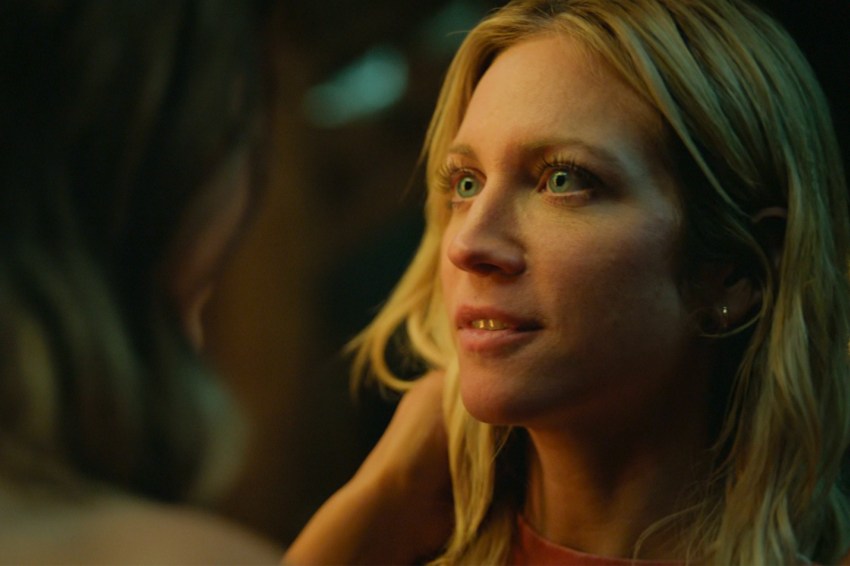
If we define manipulation as simply behavior or actions that are motivated by a desired outcome, then not only Sophie and Margo, but all of us are guilty of it when it comes to love. “Romance” as a verb, becomes the ultimate manipulation. We are all just trying to find someone who likes and wants us as much as we like and want them. Reciprocation is everyone’s ultimate end goal.
But what Sophie and Margo find is a truth as ugly as it is beautiful—the moral ambiguity of our own attraction. The reasons we want or like someone are inexplicable and not bound to any intrinsic moral value. Sophie doesn’t stop wanting Margo when she discovers she’s the killer, just as Margo didn’t abandon her when Sophie gets outed in front of everyone for her manslaughter charges.
They both “unmask” in front of each other throughout the series, in the moments when Margo welcomes Sophie’s voyeurism through the lake house window, when Sophie grabs Margo by the throat in the motel, when Margo shares her fears about her brother’s debt collectors, and when Sophie explains her hysterectomy scars. In this surreal world where everyone is guilty while simultaneously putting on a front for everyone else, these two stop pretending with each other, if not completely, enough for the other to clearly see what’s happening. To read between the lines and see each other for their broken, lonely, desperate selves; the “psychopaths” they really are.
Explain the ending to me like I’m a kindergartener
Let’s skip to the good part. Sophie doesn’t go to the police; she chugs airplane bottles of liquor behind the steering wheel instead. Margo leans on Callie and Kyle to come to her rescue, and Kyle catches up to Sophie on a dark winding road, where she runs him over in a deliberate reenactment of her manslaughter charges. It’s symbolic in that it finally forces her to acknowledge her past and in it, the truth—that she is no better than Margo, and guilty of all the same crimes.
While Sophie is disposing of Kyle’s body, she answers a call from Margo on his cell phone that makes for one of the most ambiguously chilling endings to a series I have ever seen. Sophie never says a word, but her labored breathing can be heard on the other line. As one TikTok critic in my feed so elegantly pointed out, it’s likely Margo knows exactly whose huffing and puffing that is.

But as I rewatched the scene for clarity (and chronology), Margo immediately confronts Kyle, telling him he better not be messing with Sophie, before any breathing is heard. So my gut tells me it’s a genuine statement, not another calculated move made to manipulate or convince Sophie (who she knows is on the other line) that she had nothing to do with the attack. I think that realization comes immediately after her statements.
Margo IDs the breathing, which she’s heard up close and personal several times by now, and realizes Kyle disobeyed her orders, forcing Sophie to do the unthinkable. We can see that moment of realization displayed masterfully on Malin Åkerman’s face as she asks, “Who is this?” The call cuts off, and Sophie pushes Kyle’s lifeless body over the edge of a cliff.
Both women stare off into space, confronted with the realization that Margo really did keep her word to protect Sophie, Sophie is now just as guilty as Margo, and the question is now not whether Sophie will forgive Margo, but if Margo can forgive Sophie.
What’s next for the series?
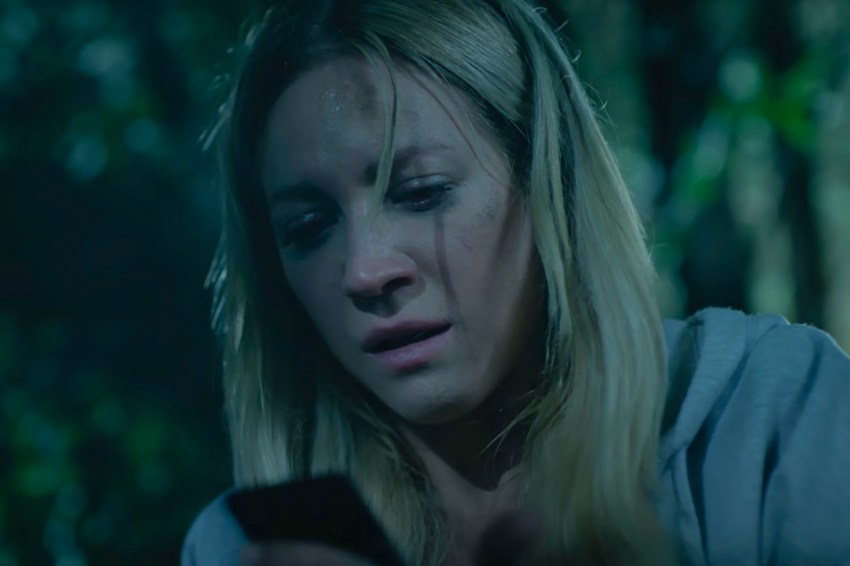
Cutter hasn’t shied away from sharing she’s hoping for a second season, which I of course will have to tune in for, but don’t think was absolutely necessary. I would have preferred to see one more episode, or at least a long-form extended finale. We need to see these two women face to face, the majority of the truth laid bare, and decide, once and for all, if they are going to come clean about their true feelings and make the decision to be fully transparent with each other.
There’s a point to be made here, that love can’t be explained or coerced. That it’s a mutual spark between two people that they can decide to shelter, fan, and fuel, allowing it to grow into something more. That it’s a refuge from a flawed and guilty world where everyone is feigning goodness and virtue signaling all of the time, the one place where you can be yourself in all of your ugliness, and be accepted by someone who knows the truth, because it’s their truth too.
In this way, the same-sex relationship becomes a metaphor for all of the psychological similarities that permeate Sophie and Margo’s relationship. The manipulative narcissists find love in their own mirrored other. They are a surreal, heightened, satirical depiction of a realistic romance, where people lie, hurt, disappoint, and forgive each other all the time, all out of the desire to be truly “seen”.
I would have loved to see Margo and Sophie run off together in Graham’s prized BMW and drive off into the sunset Thelma and Louise style, surely to land in some new town where they can combine their powers of seduction and manipulation to prey on victims together in order to build a new life, but we’ll just have to see if Netflix green lights a follow-up, and where Cutter wants to take it.
